英语反义疑问句讲解及练习题
- 格式:doc
- 大小:57.50 KB
- 文档页数:2
![反义疑问句[讲义+练习+答案]](https://uimg.taocdn.com/bce1d8e9f705cc1755270943.webp)
反义疑问句一、英文中的反意疑问句。
1、什么是反意疑问句英语中,反意疑问句是由陈述句和附在其后的附加疑问句组成。
其中附加疑问句是对陈述句所说的事实或观点提出疑问,起证实作用,一般用于证实说话者所说的事实或观点。
翻译为“是吗”2.反意疑问句的回答,回答时,如果情况属实,用Yes加上反问句的倒装肯定句;若果情况不属实,则用No加上反问句的倒装否定句。
例如You were moved by your students, weren’t you?情况属实:Yes, I were.情况不属实:No, I weren’t.二、反意疑问句中问句部分的动词与陈述部分的动词在语气上成相反的对应关系,即:肯定+否定?否定+肯定?如:①You can’t do it, can you?你不能做它,是吗?②They are very late for the meeting, aren’t they?他们开会迟到了,是吗?三.当陈述句中含有be动词,助动词,或是情态动词时,反问句部分由这些词加上主语人称代词构成,Be动词包括:am, is, are, was, were助动词有:do, does, did, have(用在完成时), has(用在完成时)等情态动词有:can, could, may, might, must, will, would, shall, should例如:She is a lovely girl, isn’t she?她是一个可爱的女孩,是吗?He will go home, __won’t__ __he__?他要回家了,是吗?She doesn’t l ike to eat popcorn, __does__ _she___?她不喜欢吃爆米花,是吗?The baby won’t sleep early, will it?小宝宝睡得不早,是吗?注意:①He has supper at home every day,doesn’t’t he? (不能用hasn’t he?)他每天在家吃晚饭,是吗?②They have known the matter, haven’t they? (不能用don’t they?)他们已经知道那事情了,是吗?四.当陈述句中只含有行为动词时,若动词加了s,就用does, 若动词为原形,就用do,动词为过去式,则用did,例如:You cleaned your house last week, _didn’t___ __you__?你上周打扫了你的房间,是吗?Your father plays the computer very well, __doesn’t__ ___he _?你父亲电脑技术很好,是吗?They look so happy today, _don’t ___ _they___?你今天看起来很高兴,是吗?五.反意疑问句的陈述部分带有little, few, never, hardly, seldom,nobody, nothing, barely, scarcely等否定意义的词时,问句部分用肯定式。
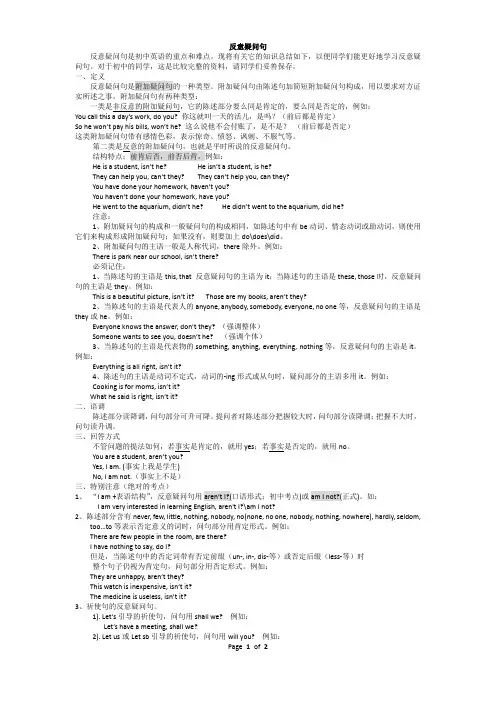
反意疑问句反意疑问句是初中英语的重点和难点。
现将有关它的知识总结如下,以便同学们能更好地学习反意疑问句。
对于初中的同学,这是比较完整的资料,请同学们妥善保存。
一、定义反意疑问句是附加疑问句的一种类型。
附加疑问句由陈述句加简短附加疑问句构成,用以要求对方证实所述之事。
附加疑问句有两种类型:一类是非反意的附加疑问句,它的陈述部分要么同是肯定的,要么同是否定的,例如:You call this a day’s work, do you? 你这就叫一天的活儿,是吗?(前后都是肯定)So he won’t pay his bills, won’t he? 这么说他不会付账了,是不是?(前后都是否定)这类附加疑问句带有感情色彩,表示惊奇、愤怒、讽刺、不服气等。
They can help you, can’t they? Th ey can’t help you, can they?You have done your homework, haven’t you?You haven’t done your homework, have you?He went to the aquarium, didn’t he? He didn’t went to the aquarium, did he?注意:1、附加疑问句的构成和一般疑问句的构成相同,如陈述句中有be动词、情态动词或助动词,则使用它们来构成形成附加疑问句;如果没有,则要加上do\does\did。
2、附加疑问句的主语一般是人称代词,there除外。
例如:There is park near our school, isn’t there?必须记住:1、当陈述句的主语是this, that 反意疑问句的主语为it;当陈述句的主语是these, those时,反意疑问句的主语是they。
例如:This is a beautiful picture, isn’t it? Those are my books, aren’t they?2、当陈述句的主语是代表人的anyone, anybody, somebody, everyone, no one等,反意疑问句的主语是they或he。
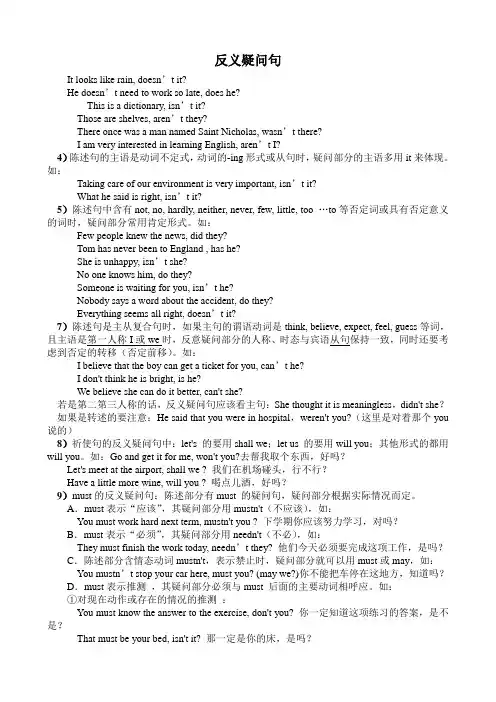
反义疑问句It looks like rain, doesn’t it?He doesn’t need to work so late, does he?This is a dictionary, isn’t it?Those are shelves, aren’t they?There once was a man named Saint Nicholas, wasn’t there?I am very interested in learning English, aren’t I?4)陈述句的主语是动词不定式,动词的-ing形式或从句时,疑问部分的主语多用it来体现。
如:Taking care of our environment is very important, isn’t it?What he said is right, isn’t it?5)陈述句中含有not, no, hardly, neither, never, few, little, too …to等否定词或具有否定意义的词时,疑问部分常用肯定形式。
如:Few people knew the news, did they?Tom has never been to England , has he?She is unhappy, isn’t she?No one knows him, do they?Someone is waiting for you, isn’t he?Nobody says a word about the accident, do they?Everything seems all right, doesn’t it?7)陈述句是主从复合句时,如果主句的谓语动词是think, believe, expect, feel, guess等词,且主语是第一人称I或we时,反意疑问部分的人称、时态与宾语从句保持一致,同时还要考虑到否定的转移(否定前移)。
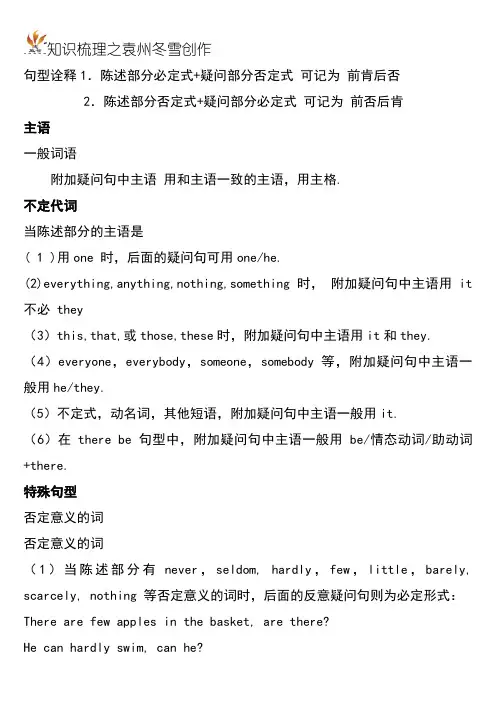
知识梳理之袁州冬雪创作句型诠释1.陈述部分必定式+疑问部分否定式可记为前肯后否2.陈述部分否定式+疑问部分必定式可记为前否后肯主语一般词语附加疑问句中主语用和主语一致的主语,用主格.不定代词当陈述部分的主语是( 1 )用one 时,后面的疑问句可用one/he.(2)everything,anything,nothing,something时,附加疑问句中主语用it 不必 they(3)this,that,或those,these时,附加疑问句中主语用it和they. (4)everyone,everybody,someone,somebody等,附加疑问句中主语一般用he/they.(5)不定式,动名词,其他短语,附加疑问句中主语一般用it.(6)在there be句型中,附加疑问句中主语一般用be/情态动词/助动词+there.特殊句型否定意义的词否定意义的词(1)当陈述部分有never,seldom, hardly,few,little,barely, scarcely, nothing 等否定意义的词时,后面的反意疑问句则为必定形式:There are few apples in the basket, are there?He can hardly swim, can he?They seldom come late, do they?(2)当陈述部分含有否定意思的词是unhappy,dislike,unfriendly等含有否定词缀的派生词,也就是有un-前缀、-less后缀等含有词缀而意思否定的词,当做必定句处理,疑问部分要用否定形式.如:He looks unhappy,doesn't he?他看上去不高兴,不是吗?The girl dislikes history,doesn't she?这女孩不喜欢汗青,不是吗?有less,fewer等词视为必定词,疑问部分用否定形式.如:There will be less pollution, won't there?暗示主语主观意愿的词含有think, believe, suppose, imagine, expect等动词后接宾语从句构成的主从复合句在构成反意疑问句时,视情况分歧有两种分歧的构成方式.(1.)当主句的主语为第一人称时,其后的简短问句应与从句相一致.例如:I expect our English teacher will be back this weekend, won't she/he?We suppose you have finished the project, haven't you?值得注意的是,当这些动词后接的宾语从句的否定转移到主句时,其仍属否定句,故其后的简短问句应用必定式,而非否定式.例如:I don't believe that he can translate this book, can he?We don't imagine the twins have arrived, have they?此类句子的回答同"前否后肯"型反意疑问句一样,如上述后一个句子,若双胞胎已经到了,则回答为"Yes, they have.";若尚未到达,使用"No, they haven't.".(2).当主句的主语为第二、三人称时,其后的简短问句则应与主句相一致(此时,否定只看主句,与从句无关...).例如:Your sister supposes she needs no help, doesn't she?You thought they could have completed the project, didn't you? They don't believe she's an engineer, do they?She doesn't expect that we are coming so soon, does she?(3)但如果主句的时态是过去时等等,疑问句应和主句的人称时态坚持一致. had better或have陈述部分有had better,或其中的have暗示完成时态时,疑问句应用hadn’t等开首:You’d better get up early, hadn’t you?其他情况句中有have时疑问句应用don't等开首如have暗示“有”的时候,有两种形式:-He has two sisters,doesn't he?-He doesn't have any sisters,doeshe?祈使句当陈述部分是祈使句时,疑问句要根据语气来表达当开首是Let‘s时,一定要用shall we.其余都用will you(包含 Let us)不管必定否定Let’s go out for a walk, shall we?Let us go out for a walk, will you?Let me help you,may I?Turn on the radio, will you?There be句型There be 句型中,反义疑问部分必须为be 动词 + thereThere are some apples in the basket, aren't there?There isn't any milk left, is there?must.当陈述部分有情态动词must,问句有4种情况:(1)mustn't暗示“制止,不成,不必”时,附加问句通常要用must.You mustn't stop your car here,must you? 你不克不及把车停在这地方,知道吗?(2)must暗示“有需要”时,附加问句通常要用needn't.They must finish the work today,needn't they? 他们明天要完成这项工作,是吗?(3)当must用来暗示对现在的情况停止推测时,问句通常要根据must后面的动词采取相应的形式. He must be good at English,isn't he? 他英语一定学得很好,是吗?(4)当must+have done暗示对过去的情况停止推测(一般句中有明白的过去时间状语),问句要根据陈述部分谓语的情况用“didn't+主语”或“wasn't/weren't+主语”;如果强调动作的完成(一般没有明白的过去时间状语),问句要用“haven't/hasn't+主语”.She must have read the novel last week,didn't she? 她上星期一定读了这本小说,是吗?You must have told her about it,haven't you? 你一定把这事告诉她了,是吗?回答反意疑问句的回答用yes, no,但是,回答意思相反,当陈述部分是否定形式时,回答要按事实.如:They don’t work hard, do they? 他们不太尽力工作,是吗?Yes, they do. 不,他们工作尽力./No, they don’t. 对,他们工作不尽力必定反意疑问句的回答当陈述部分为否定式,反意疑问句为必定式时,其回答往往与汉语纷歧致,需特别引起注意:"It isn’t cheap, is it?" "Yes, it is." “它不便宜吧?”“不,很便宜.”"He doesn’t love her, does he?" "No, he doesn’t."“他不爱她,是吗?”“是的,他不爱她.”此时,"Yes"即不,对前面"It isn't cheap."的否定.否定反意疑问句的回答当陈述部分为必定式,反意疑问句为否定式时,其回答一般不会造成坚苦,一般只需照情况回答即可:"It’s new, isn’t it?" "Yes, it is." “是新的,对吗?”“对,是新的.”"He wants to go, doesn’t he?" "No, he doesn’t." “他想去,对吗?”“不,他不想去.”此时,"Yes"即是,对前面"It's new."的必定.回答反意疑问句的原则回答反意疑问句通常应根据实际情况来确定,如有人问你You are asleep, aren’t you? 你应回答No, I’m not. 因为既然你能回答,必定你还没有asleep.但如果他人问你 You aren’t asleep, are you?(你还没有睡着,对吗),你也只能回答No, I’m not.(是的,还没有睡着),而不克不及回答为Yes, I’m not. 也不克不及回答成 Yes, I am.“It is a beautiful flower,isn't it?”“It isn't a beautiful flower,is it?”上述两句句子的回答必定均为“Yes,it is."否定为“No,it isn't."由上述例子可知,反义疑问句回答与句子自己所包含的中文必定与否的含义并没有太大关联,只需注意事实,必定即用yes,否定用no,无需思索句子原本是前否后肯或是前肯后否.反义疑问句操练典题精析1. Linda ate nothing this morning, ___?A. didn’t sheB. was sheC. did sheD. wasn’t she2. There’s hardly___ milk in the bottle, _____there?A. no, isn’tB. some, isC. little, isn’tD. any, is3. He has never ridden a horse before, ___?A. does heB. has heC. hasn’t heD. doesn’t he4. —He seldom came here, _____? —Yes sir.A. didn’t heB. does heC. doesn’t heD. did he5. Everything seems all right, _____ ?A. does itB. don’t theyC. won’t itD. doesn’t it6. One can’t be too modest, can _____ ?A. oneB. heC. itD. we7. No one failed in the exam, _____ ?A. was heB. did oneC. did theyD. didn’t he8. Neither you nor I am an artist, _____ ?A. am IB. aren’t weC. are weD. ain’t I9. He can’t be her father, _____ he?A. isB. isn’tC. canD. can’t10. They have no time to visit the museum, _____?A. do theyB. haven’t theyC. don’t theyD. will they11. You’d better go at once, _____ you?A. hadn’tB. didC. didn’tD. don’t12. You’d rather work than play, _____ you?A. hadn’tB. wouldn’tC. didn’tD. mustn’t13. You dare not do that, _____ you?A. don’tB. doC. dareD. daren’t14. He dislikes the two subjects, _____ he?A. doesB. doesn’tC. isD. isn’t15. These tools are useless now, _____ ?A. are theyB. aren’t theyC. is itD. isn’t it16. He used to get up at 6:30, _____ he?A. didn’t heB. did heC. used heD. wouldn’t he17. He ought to win the first prize, _______ he?A. mustn’tB. oughtn’tC. shouldn’tD. Both B and C.18. Let’s go there by bus, ___?A. will youB. shall weC. don’t youD. will you19. Let us go to play football, ___?A. will youB. shall weC. do weD. are we20. Don’t forget to give Polly some food and change her water, ___?A. will youB. shall weC. won’t youD. do you21. —Let’s go shopping thi s afternoon, _____? —All right.A. will weB. shall weC. don’t weD. are we22. —Pass me the dictionary, _____?—Yes, with pleasure.A. would youB. will youC. won’t youD. wouldn’t you23. There is little water in the glass, ____?A. isn’t thereB. isn’t itC. is itD. is there24. There won’t be any concert this Saturday evening, _____ ?A. will there notB. will thereC. is thereD. won’t25. —I guess she taught herself Japanese, ______? —Yes.A. don’t IB. did sheC. do ID. didn’t sh e26. I don’t believe you are right, _____ ?A. are youB. do youC. won’t youD. do27. She doesn’t think that Tom sings best in the class, _____ ?A. does sheB. doesn’t sheC. does heD. doesn’t he28. I know you didn’t want to hurt me, _____ ?A. did youB. didn’t youC. do ID. don’t I29. If my father were here he would be very happy, _____ ?A. weren’t heB. were heC. wouldn’t heD. would he才能提升1. It’s the third time that John has been late, ____?A. hasn’t heB. isn’t heC. isn’t itD. hasn’t it2. Let’s take a rest, ___________.A. will weB. shall weC. shan’t weD. won’t we3. Let us pass, _________? A. shan’t we B. shall we C.won’t we D. will you4. Wait a minute, __________?A. shall youB. will youC. do youD. don’t you5. The suit’s finished, __________?A. doesn’t it B. isn’t itC. haven’t youD. hasn’t it6. He’s posted the letter, _________he?A. isn’t B.doesn’t C. hasn’t D. wasn’t7. They’d go with us, __________?A. wouldn’t theyB. didn’t theyC. hadn’t theyD. couldn’t they8. What fresh air, ________?A. is it B. does it C.isn’t it D. doesn’t it9. The Emperor’s clothes became the talk of the whole city,_________?A. did itB. didn’t itC. did theyD. didn’t they10.Mr. And Mrs. Turner work in this hospital, ________?A. are theyB. aren’t theyC. do theyD. don’t they11. She has breakfast at six every day, ________?A. has sheB. hasn’t sheC. does sheD. doesn’t she12. Nothing seems to please her, _________?A. does it B.doesn’t it C. is it D. isn’t it13. She never tells a lie, ________? A. does she B. doesn’t she C. is it D. isn’t it14. You hardly know each other, _________?A. do youB. don’t youC. have youD. didn’t you15. The man in blue must be your brother, _____?A. mustn’t heB. needn’t heC. isn’t heD. is he16. I don’t think he will come to our party, _____?A. will heB. won’t heC. does heD. do I17. I suppose he’s serious, ___________?A. do IB. don’t IC. is heD.isn’t he18. Wang said that he was not there then, _____?A. did heB. didn’t heC. was heD. wasn’t he19. You daren’t say that to h im, _________?A. dare youB. do youC. daren’t youD. don’t you20. You must have read about Dickens long ago, __________?A. mustn’t youB. haven’t youC. can’t youD. didn’t you随堂小测(三智题库QYF)21. You’d better not smoke here, ________?A. will youB. shall youC. have youD. had you22.There isn’t going to be a volleyball match next week, __________?23.A. is it B. isn’t it C. is there D. isn’t there23. There used to be a church behind the cemetery, _____________?A. didn’t thereB. used thereC. usedn’t itD. didn’t it24. What a lovely day, _________? A. doesn’t it B. hasn’t itC. won’tD. isn’t it25. You must have been there, ____________?A. have youB. did youC. haven’t youD. didn’t you26. That is your school, ___________?A. isn’t thatB. mustn’t itC. isn’t itD. won’t it27. She dislikes this skirt, _________________?A. doesn’t sheB. does sheC. isn’t sheD. is she28. No one can stop us from going there, ______?A. can’t itB. can theyC. can’t theyD. can one师生互动分数评语错题归档确认答案典题精析. 1-5 CDBDD 6-10 ACCAA 11-15 ABCBB 16-20 ADBAA 21-25 BBDBD 26-29 AAAC-5CBDBB 6-10 CACDD11-15DAAAC 16-20 ADBAD随堂小测21-25 DCADC 26-28CAB。
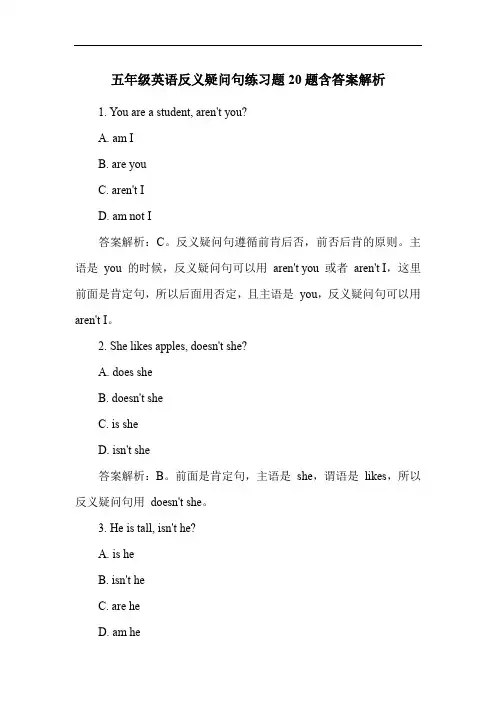
五年级英语反义疑问句练习题20题含答案解析1. You are a student, aren't you?A. am IB. are youC. aren't ID. am not I答案解析:C。
反义疑问句遵循前肯后否,前否后肯的原则。
主语是you 的时候,反义疑问句可以用aren't you 或者aren't I,这里前面是肯定句,所以后面用否定,且主语是you,反义疑问句可以用aren't I。
2. She likes apples, doesn't she?A. does sheB. doesn't sheC. is sheD. isn't she答案解析:B。
前面是肯定句,主语是she,谓语是likes,所以反义疑问句用doesn't she。
3. He is tall, isn't he?A. is heB. isn't heC. are heD. am he答案解析:B。
前肯后否,主语是he,be 动词是is,所以反义疑问句用isn't he。
4. They are happy, aren't they?A. are theyB. aren't theyC. is theyD. am they答案解析:B。
前肯后否,主语是they,be 动词是are,所以反义疑问句用aren't they。
5. I am a teacher, aren't I?A. am IB. are youC. aren't ID. am not I答案解析:C。
前肯后否,主语是I,反义疑问句可以用aren't I 或者am I not。
6. She has a book, doesn't she?A. does sheB. doesn't sheC. has sheD. hasn't she答案解析:B。
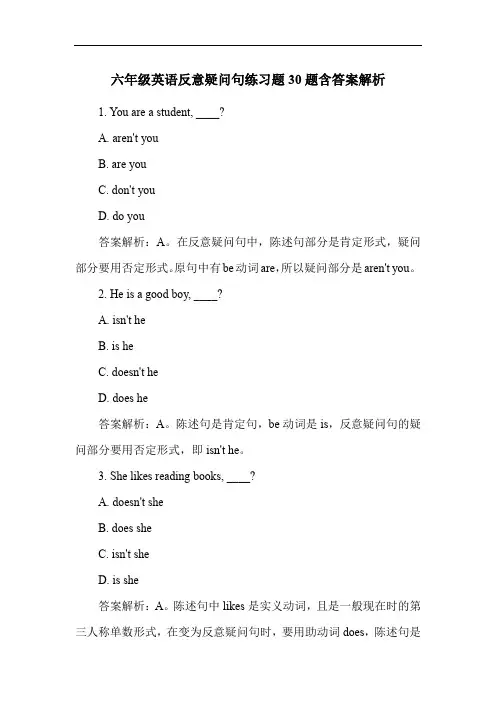
六年级英语反意疑问句练习题30题含答案解析1. You are a student, ____?A. aren't youB. are youC. don't youD. do you答案解析:A。
在反意疑问句中,陈述句部分是肯定形式,疑问部分要用否定形式。
原句中有be动词are,所以疑问部分是aren't you。
2. He is a good boy, ____?A. isn't heB. is heC. doesn't heD. does he答案解析:A。
陈述句是肯定句,be动词是is,反意疑问句的疑问部分要用否定形式,即isn't he。
3. She likes reading books, ____?A. doesn't sheB. does sheC. isn't sheD. is she答案解析:A。
陈述句中likes是实义动词,且是一般现在时的第三人称单数形式,在变为反意疑问句时,要用助动词does,陈述句是肯定句,所以疑问部分是否定形式doesn't she。
4. They play football every day, ____?A. don't theyB. do theyC. aren't theyD. are they答案解析:A。
原句中play是实义动词,一般现在时,主语是they,在构成反意疑问句时,要用助动词do,陈述句为肯定句,疑问部分为否定形式don't they。
5. There is a cat under the table, ____?A. isn't thereB. is thereC. doesn't thereD. does there答案解析:A。
陈述句是there be结构,这里是肯定句,be动词是is,反意疑问句的疑问部分为否定形式isn't there。
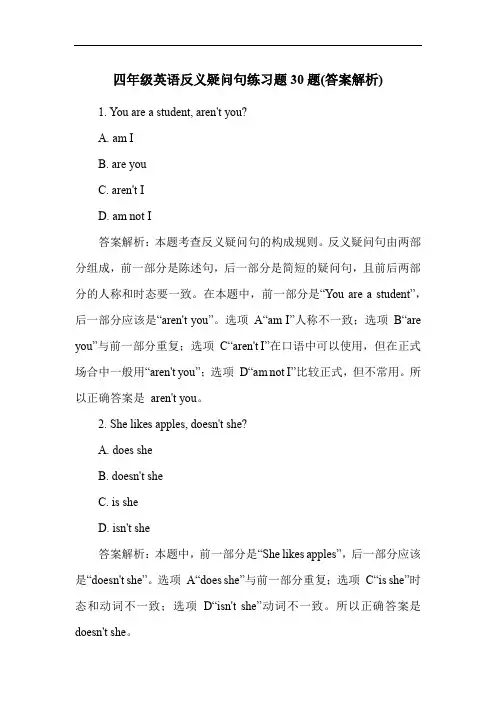
四年级英语反义疑问句练习题30题(答案解析)1. You are a student, aren't you?A. am IB. are youC. aren't ID. am not I答案解析:本题考查反义疑问句的构成规则。
反义疑问句由两部分组成,前一部分是陈述句,后一部分是简短的疑问句,且前后两部分的人称和时态要一致。
在本题中,前一部分是“You are a student”,后一部分应该是“aren't you”。
选项A“am I”人称不一致;选项B“are you”与前一部分重复;选项C“aren't I”在口语中可以使用,但在正式场合中一般用“aren't you”;选项D“am not I”比较正式,但不常用。
所以正确答案是aren't you。
2. She likes apples, doesn't she?A. does sheB. doesn't sheC. is sheD. isn't she答案解析:本题中,前一部分是“She likes apples”,后一部分应该是“doesn't she”。
选项A“does she”与前一部分重复;选项C“is she”时态和动词不一致;选项D“isn't she”动词不一致。
所以正确答案是doesn't she。
3. He is tall, isn't he?A. is heB. isn't heC. are heD. am he答案解析:前一部分是“He is tall”,后一部分应为“isn't he”。
选项A“is he”与前一部分重复;选项C“are he”人称和动词不一致;选项D“am he”人称和动词不一致。
正确答案是isn't he。
4. They play football, don't they?A. do theyB. don't theyC. are theyD. aren't they答案解析:前一部分是“They play football”,后一部分是“don't they”。
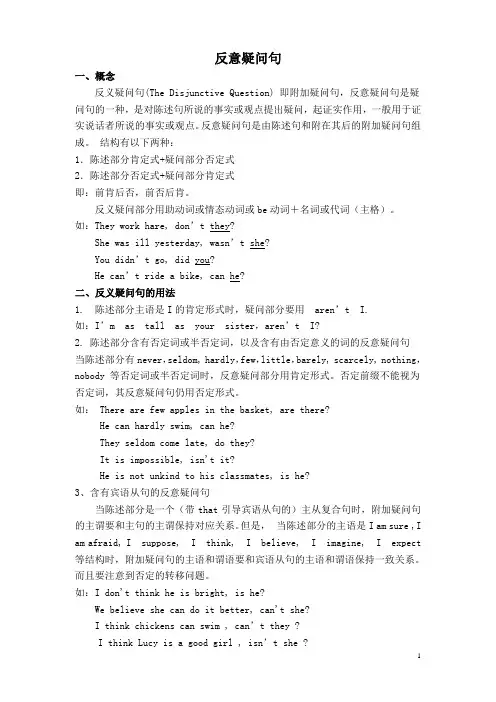
反意疑问句一、概念反义疑问句(The Disjunctive Question) 即附加疑问句,反意疑问句是疑问句的一种,是对陈述句所说的事实或观点提出疑问,起证实作用,一般用于证实说话者所说的事实或观点。
反意疑问句是由陈述句和附在其后的附加疑问句组成。
结构有以下两种:1.陈述部分肯定式+疑问部分否定式2.陈述部分否定式+疑问部分肯定式即:前肯后否,前否后肯。
反义疑问部分用助动词或情态动词或be动词+名词或代词(主格)。
如:They work hare, don’t they?Sh e was ill yesterday, wasn’t she?You didn’t go, did you?He can’t ride a bike, can he?二、反义疑问句的用法1. 陈述部分主语是I的肯定形式时,疑问部分要用aren’t I.如:I’m as tall as your sister,aren’t I?2. 陈述部分含有否定词或半否定词,以及含有由否定意义的词的反意疑问句当陈述部分有never,seldom, hardly,few,little,barely, scarcely, nothing,nobody 等否定词或半否定词时,反意疑问部分用肯定形式。
否定前缀不能视为否定词,其反意疑问句仍用否定形式。
如: There are few apples in the basket, are there?He can hardly swim, can he?They seldom come late, do they?It is impossible, isn't it?He is not unkind to his classmates, is he?3、含有宾语从句的反意疑问句当陈述部分是一个(带that引导宾语从句的)主从复合句时,附加疑问句的主谓要和主句的主谓保持对应关系。
但是,当陈述部分的主语是I am sure ,I am afraid, I suppose, I think, I believe, I imagine, I expect 等结构时,附加疑问句的主语和谓语要和宾语从句的主语和谓语保持一致关系。
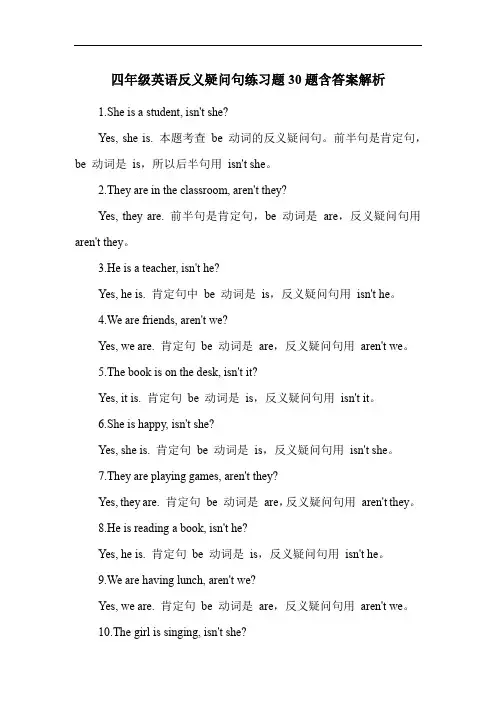
四年级英语反义疑问句练习题30题含答案解析1.She is a student, isn't she?Yes, she is. 本题考查be 动词的反义疑问句。
前半句是肯定句,be 动词是is,所以后半句用isn't she。
2.They are in the classroom, aren't they?Yes, they are. 前半句是肯定句,be 动词是are,反义疑问句用aren't they。
3.He is a teacher, isn't he?Yes, he is. 肯定句中be 动词是is,反义疑问句用isn't he。
4.We are friends, aren't we?Yes, we are. 肯定句be 动词是are,反义疑问句用aren't we。
5.The book is on the desk, isn't it?Yes, it is. 肯定句be 动词是is,反义疑问句用isn't it。
6.She is happy, isn't she?Yes, she is. 肯定句be 动词是is,反义疑问句用isn't she。
7.They are playing games, aren't they?Yes, they are. 肯定句be 动词是are,反义疑问句用aren't they。
8.He is reading a book, isn't he?Yes, he is. 肯定句be 动词是is,反义疑问句用isn't he。
9.We are having lunch, aren't we?Yes, we are. 肯定句be 动词是are,反义疑问句用aren't we。
10.The girl is singing, isn't she?Yes, she is. 肯定句be 动词是is,反义疑问句用isn't she。
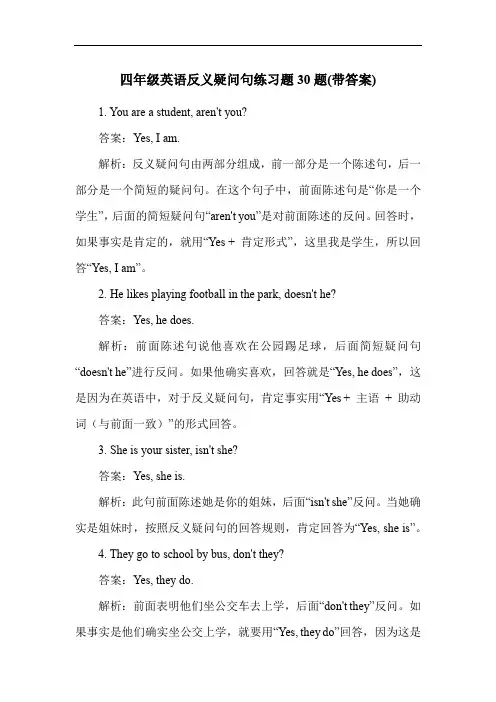
四年级英语反义疑问句练习题30题(带答案)1. You are a student, aren't you?答案:Yes, I am.解析:反义疑问句由两部分组成,前一部分是一个陈述句,后一部分是一个简短的疑问句。
在这个句子中,前面陈述句是“你是一个学生”,后面的简短疑问句“aren't you”是对前面陈述的反问。
回答时,如果事实是肯定的,就用“Yes + 肯定形式”,这里我是学生,所以回答“Yes, I am”。
2. He likes playing football in the park, doesn't he?答案:Yes, he does.解析:前面陈述句说他喜欢在公园踢足球,后面简短疑问句“doesn't he”进行反问。
如果他确实喜欢,回答就是“Yes, he does”,这是因为在英语中,对于反义疑问句,肯定事实用“Yes + 主语+ 助动词(与前面一致)”的形式回答。
3. She is your sister, isn't she?答案:Yes, she is.解析:此句前面陈述她是你的姐妹,后面“isn't she”反问。
当她确实是姐妹时,按照反义疑问句的回答规则,肯定回答为“Yes, she is”。
4. They go to school by bus, don't they?答案:Yes, they do.解析:前面表明他们坐公交车去上学,后面“don't they”反问。
如果事实是他们确实坐公交上学,就要用“Yes, they do”回答,因为这是对肯定事实的回应。
5. Your mother cooks well, doesn't she?答案:Yes, she does.解析:前面说你妈妈做饭做得好,后面“doesn't she”反问。
如果妈妈做饭确实好,就回答“Yes, she does”,这遵循了反义疑问句肯定事实肯定回答的原则。
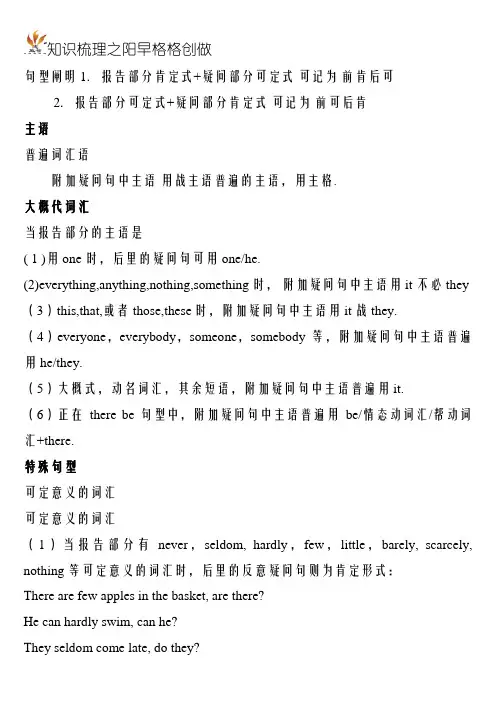
知识梳理之阳早格格创做句型阐明1.报告部分肯定式+疑问部分可定式可记为前肯后可2.报告部分可定式+疑问部分肯定式可记为前可后肯主语普遍词汇语附加疑问句中主语用战主语普遍的主语,用主格.大概代词汇当报告部分的主语是( 1 )用one 时,后里的疑问句可用one/he.(2)everything,anything,nothing,something时,附加疑问句中主语用it 不必 they (3)this,that,或者those,these时,附加疑问句中主语用it战they.(4)everyone,everybody,someone,somebody等,附加疑问句中主语普遍用he/they.(5)大概式,动名词汇,其余短语,附加疑问句中主语普遍用it.(6)正在there be句型中,附加疑问句中主语普遍用be/情态动词汇/帮动词汇+there.特殊句型可定意义的词汇可定意义的词汇(1)当报告部分有never,seldom, hardly,few,little,barely, scarcely, nothing 等可定意义的词汇时,后里的反意疑问句则为肯定形式:There are few apples in the basket, are there?He can hardly swim, can he?They seldom come late, do they?(2)当报告部分含有可定意义的词汇是unhappy,dislike,unfriendly等含有可定词汇缀的派死词汇,也便是有un-前缀、-less后缀等含有词汇缀而意义可定的词汇,当干肯定句处理,疑问部分要用可定形式.如:He looks unhappy,doesn't he?他瞅上去不下兴,不是吗?The girl dislikes history,doesn't she?那女孩不喜欢履历,不是吗?有less,fewer等词汇视为肯定词汇,疑问部分用可定形式.如:There will be less pollution, won't there?表示主语主瞅意愿的词汇含有think, believe, suppose, imagine, expect等动词汇后交宾语从句形成的主从复合句正在形成反意疑问句时,视情况分歧有二种分歧的形成办法.(1.)当主句的主语为第一人称时,其后的简短问句应与从句相普遍.比圆:I expect our English teacher will be back this weekend, won't she/he?We suppose you have finished the project, haven't you?值得注意的是,当那些动词汇后交的宾语从句的可定变化到主句时,其仍属可定句,故其后的简短问句应用肯定式,而非可定式.比圆:I don't believe that he can translate this book, can he?We don't imagine the twins have arrived, have they?此类句子的回问共"前可后肯"型反意疑问句一般,如上述后一个句子,若单胞胎已经到了,则回问为"Yes, they have.";若尚已到达,使用"No, they haven't.".(2).当主句的主语为第二、三人称时,其后的简短问句则应与主句相普遍(此时,可定只瞅主句,与从句无闭...).比圆:Your sister supposes she needs no help, doesn't she?You thought they could have completed the project, didn't you?They don't believe she's an engineer, do they?She doesn't expect that we are coming so soon, does she?(3)然而如果主句的时态是往日时等等,疑问句应战主句的人称时态脆持普遍. had better或者have报告部分有had better,或者其中的have表示完毕时态时,疑问句应用hadn’t 等启头:You’d better get up early, hadn’t you?其余情况句中有have时疑问句应用don't等启头如have表示“有”的时间,有二种形式:-He has two sisters,doesn't he?-He doesn't have any sisters,doeshe?祈使句当报告部分是祈使句时,疑问句要根据语气去表白当启头是Let‘s时,一定要用shall we.其余皆用will you(包罗 Let us)不管肯定可定Let’s go out for a walk, shall we?Let us go out for a walk, will you?Let me help you,may I?Turn on the radio, will you?There be句型There be 句型中,反义疑问部分必须为be 动词汇 + thereThere are some apples in the basket, aren't there?There isn't any milk left, is there?must.当报告部分多情态动词汇must,问句有4种情况:(1)mustn't表示“克制,不可,不必”时,附加问句常常要用must.You mustn't stop your car here,must you? 您不克不迭把车停正在那场合,知讲吗?(2)must表示“有需要”时,附加问句常常要用needn't.They must finish the work today,needn't they? 他们即日要完毕那项处事,是吗?(3)当must用去表示对于当前的情况举止推测时,问句常常要根据must后里的动词汇采与相映的形式. He must be good at English,isn't he? 他英语一定教得很佳,是吗?(4)当must+have done表示对于往日的情况举止推测(普遍句中有粗确的往日时间状语),问句要根据报告部分谓语的情况用“didn't+主语”或者“wasn't/weren't+主语”;如果强安排做的完毕(普遍不粗确的往日时间状语),问句要用“haven't/hasn't+主语”.She must have read the novel last week,didn't she? 她上星期一定读了那本小道,是吗?You must have told her about it,haven't you? 您一定把那事报告她了,是吗?回问反意疑问句的回问用yes,no,然而是,回问意义差异,当报告部分是可定形式时,回问要按究竟.如:They don’t work hard, do they? 他们不太全力处事,是吗?Yes, they do. 不,他们处事全力./No, they don’t. 对于,他们处事不全力肯定反意疑问句的回问当报告部分为可定式,反意疑问句为肯定式时,其回问往往与汉语纷歧致,需特天引起注意:"It isn’t cheap, is it?" "Yes, it is." “它不廉价吧?”“不,很廉价.”"He doesn’t love her, does he?" "No, he doesn’t."“他不爱她,是吗?”“是的,他不爱她.”此时,"Yes"即不,对于前里"It isn't cheap."的可定.可定反意疑问句的回问当报告部分为肯定式,反意疑问句为可定式时,其回问普遍不会制成艰易,普遍只需照情况回问即可:"It’s new, isn’t it?" "Yes, it is." “是新的,对于吗?”“对于,是新的.”"He wants to go, doesn’t he?" "No, he doesn’t." “他念去,对于吗?”“不,他不念去.”此时,"Yes"即是,对于前里"It's new."的肯定.回问反意疑问句的准则回问反意疑问句常常应根据本质情况去决定,如有人问您You are asleep, aren’t you? 您应回问No, I’m not. 果为既然您能回问,肯定您还不asleep.然而如果他人问您 You aren’t asleep, are you?(您还不睡着,对于吗),您也只可回问No, I’m not.(是的,还不睡着),而不克不迭回问为Yes, I’m not. 也不克不迭回问成 Yes, I am.“It is a beautiful flower,isn't it?”“It isn't a beautiful flower,is it?”上述二句句子的回问肯定均为“Yes,it is."可定为“No,it isn't."由上述例子可知,反义疑问句回问与句子自己所包罗的华文肯定与可的含意并不太大闭联,只需注意究竟,肯定即用yes,可定用no,无需思量句子本本是前可后肯或者是前肯后可.反义疑问句训练典题粗析1. Linda ate nothing this morning, ___?A. didn’t sheB. was sheC. did sheD. wasn’t she2. There’s hardly___ milk in the bottle, _____there?A. no, isn’tB. some, isC. little, isn’tD. any, is3. He has never ridden a horse before, ___?A. does heB. has heC. hasn’t heD. doesn’t he4. —He seldom came here, _____? —Yes sir.A. didn’t heB. does heC. doesn’t heD. did he5. Everything seems all right, _____ ?A. does itB. don’t theyC. won’t itD. doesn’t it6. One can’t be too modest, can _____ ?A. oneB. heC. itD. we7. No one failed in the exam, _____ ?A. was heB. did oneC. did theyD. didn’t he8. Neither you nor I am an artist, _____ ?A. am IB. aren’t weC. are weD. ain’t I9. He can’t be her father, _____he?A. isB. isn’tC. canD. can’t10. They have no time to visit the museum, _____?A. do theyB. haven’t theyC. don’t theyD. will they11. You’d better go at once, _____ you?A. hadn’tB. didC. didn’tD. don’t12. You’d rather work than play, _____ you?A. hadn’tB. wouldn’tC. didn’tD. mustn’t13. You dare not do that, _____ you?A. don’tB. doC. dareD. daren’t14. He dislikes the two subjects, _____ he?A. doesB. doesn’tC. isD. isn’t15. These tools are useless now, _____ ?A. are theyB. aren’t theyC. is itD. isn’t it16. He used to get up at 6:30, _____ he?A. didn’t heB. did heC. used heD. wouldn’t he17. He ought to win the first prize, _______ he?A. mustn’tB. oughtn’tC. shouldn’tD. Both B and C.18. Let’s go ther e by bus, ___?A. will youB. shall weC. don’t youD. will you19. Let us go to play football, ___?A. will youB. shall weC. do weD. are we20. Don’t forget to give Polly some food and change her water, ___?A. will youB. shall weC. won’t youD.do you21. —Let’s go shopping this afternoon, _____? —All right.A. will weB. shall weC. don’t weD. are we22. —Pass me the dictionary, _____? —Yes, with pleasure.A. would youB. will youC. won’t youD. wouldn’t you23. There is little water in the glass, ____?A. isn’t thereB. isn’t itC. is itD. is there24. There won’t be any concert this Saturday evening, _____ ?A. will there notB. will thereC. is thereD. won’t25. —I guess she taught herself Japanese, ______?—Yes.A. don’t IB. did sheC. do ID. didn’t she26. I don’t believe you are right, _____ ?A. are youB. do youC. won’t youD. do27. She doesn’t think that Tom sings best in the class, _____ ?A. does sheB. doesn’t sheC. does heD. doesn’t he28. I know you didn’t want to hurt me, _____ ?A. did youB. didn’t youC. do ID. don’t I29. If my father were here he would be very happy, _____ ?A. weren’t heB. were heC. wouldn’t heD. would he本领提下1. It’s the third time that John has been late, ____?A. h asn’t heB. isn’t heC. isn’t itD. hasn’t it2. Let’s take a rest, ___________.A. will weB. shall weC. shan’t weD. won’t we3. Let us pass, _________? A. shan’t we B. shall we C. won’t we D. will you4. Wait a minute, __________?A. shall youB. will youC. do youD. don’t you5. The suit’s finished, __________?A. doesn’t it B. isn’t it C. haven’t youD. hasn’t it6. He’s posted the letter, _________he?A. isn’t B. doesn’t C. hasn’t D. wasn’t7. They’d go with us, __________?A. wouldn’t theyB. didn’t theyC. hadn’t theyD. couldn’t they8. What fresh air, ________?A. is it B. does it C. isn’t it D. doesn’t it9. The Emperor’s clothes became the talk of the whole city, _________?A. did itB. didn’t itC. did theyD. didn’t they10.Mr. And Mrs. Turner work in this hospital, ________?A. are theyB. aren’t theyC. do theyD. don’t they11. She has breakfast at six every day, ________?A. has sheB. hasn’t sheC. does sheD. doesn’t she12. Nothing seems to please her, _________?A. does it B. doesn’t it C. is it D. isn’t it13. She never tells a lie, ________? A. does she B. doesn’t she C. is it D. isn’t it14. You hardly know each other, _________?A. do youB. don’t youC. have youD. didn’t you15. The man in blue must be your brother, _____?A. mustn’t heB. needn’t heC. isn’t heD. is he16. I don’t think he will come to our party, _____?A. will heB. won’t heC. does heD. do I17. I suppose he’s serious, ___________?A. do IB. don’t IC. is heD. isn’t he18. Wang said that he was not there then, _____?A. did heB. didn’t heC. was heD. was n’t he19. You daren’t say that to him, _________?A. dare youB. do youC. daren’t youD. don’t you20. You must have read about Dickens long ago, __________?A. mustn’t youB. haven’t youC. can’t youD. didn’t you随堂小测(三智题库QYF)21. You’d better not smoke here, ________?A. will youB. shall youC. have youD. had you22.There isn’t going to be a volleyball match next week, __________?23.A. is it B. isn’t it C. is there D. isn’t there23. There used to be a church behind the cemetery, _____________?A. didn’t thereB. used thereC. usedn’t itD. didn’t it24. What a lovely day, _________? A. doesn’t it B. hasn’t it C. won’t D. isn’t it25. You must have been there, ____________?A. have youB. did youC. haven’t youD. didn’t you26. That is your school, ___________?A. isn’t thatB. mustn’t itC. isn’t itD. won’t it27. She dislikes this skirt, _________________?A. doesn’t sheB. does sheC. isn’t sheD. is she28. No one can stop us from going there, ______?A. can’t itB. can theyC. can’t theyD. can one师死互动分数评语错题归档确认问案典题粗析. 1-5 CDBDD 6-10 ACCAA 11-15 ABCBB 16-20 ADBAA 21-25BBDBD 26-29 AAAC-5CBDBB 6-10 CACDD11-15DAAAC 16-20 ADBAD 随堂小测21-25 DCADC 26-28CAB。
反意疑问句讲解 1. 前肯(定)+后否(定)? 一、反意疑问句中问句部分的动词在时态上应和陈述部分的时态一致。如: 1。You can do it, can’t you? 2.They are very late for the meeting, aren’t they? 3.He has supper at home every day, doesn’t he? (不能用hasn’t he?) 4.They have known the matter, haven’t they? 5.They will go to town soon, won’t they? 6.He worked very hard, didn’t he? 他过去工作很努力,对吧? Yes, he did. No, he didn’t. 是的,他很努力。 不,他工作不努力。 二.前否(定)+后肯(定)? 反意疑问句的陈述部分含有not no,nothing, no one, never, hardly, little, few,seldom等表否定的词。变反意疑问句时要用前否(定)+后肯(定)? 如:1.He isn’t playing football now, is he? 2.She never tells a lie, does she?(不用doesn’t she?) 3.I have few books, do I? 4, He was seldom late, was he?(不用wasn’t he?) 5.There is little water in the bag, is there? 6.Nothing is in the room, is it? 房间里什么也没有,是吗? 7,The boys and girls have never been to Chongqing, have they? 孩子们从未去过重庆,对吧? 三.由un-, im-, in-, dis-, 等否定意义的前缀构成的词语时,陈述部分要视为肯定含义,问句部分用否定形式。如: ①Your father is unhappy, isn’t he?(不能用is he?) ②The man is dishonest, isn’t he? (不能用is he?) ③It is impossible to learn English without remembering more words, isn’t it?(不能用is it ?) 四.反意疑问句的陈述部分为I am…时,问句部分习惯上用aren’t I?表示。如: I am a very honest man, aren’t I? 五.反意疑问句的陈述部分为I(We) think(believe, suppose, consider) + that从句时,问句部分的动词及主语与that从句内的动词和主语保持一致。如: ①I think that he has done his best, hasn’t he? ②We think that English is very useful, isn’t it? (不用don’t we?) 八.反意疑问句的陈述部分为I(We) don’t think(believe, suppose, consider)+ that从句时,从句为否定意义,问句部分的动词和主语仍与that从句保持一致且用肯定式。如: ①I don’t think that you can do it, can you? (不用do I?) ②We don’t believe that the news is true, is it? (不用do we?) 九.反意疑问句的陈述部分为非第一人称主语+ think(believe, suppose, consider) + that从句时,问句部分的动词和主语与陈述部分的主句动词和主语保持一致。如: ①They all think that English is very important, don’t they? (不用isn’t it?) ②He didn’t think that the news was true, did he? (不用wasn’t/ was it?) 十、反意疑问句的陈述部分为主语+said( told, reported, asked……) + that从句时,问句部分的动词和主语与陈述部分的主句动词和主语保持一致。如: ①They said that you had finished your work, didn’t they? (不用hadn’t you) ②Kate told you that she would go there, didn’t she? (不用wouldn’t she?) 十一、陈述部分的主语为不定代词something, anything, nothing, everything时,问句部分的主语用it。如: ① Something is wrong with the computer, isn’t it? ② Nothing has happened to them, has it? 十二、陈述部分的主语为不定代词somebody(someone), anybody(anyone), nobody(no one), everybody(everyone)时,问句部分的主语用he或 they,这时问句动词的数应和he或 they一致。如: ①Someone has taken the seat, hasn’t he? ③ Everyone has done their best in the game, haven’t they? 十三。This is a pen , isn’t it?(不能说isn’t this ?) That is a book,, isn’t it ? (不能说isn’t that ?) These /Those are maps, aren’t they ? (不能说aren’t these /those?) 十四、陈述部分为Let us……时,问句部分习惯上用will you?形式。如: Let us stop to rest, will you? 十五、陈述部分为Let’s……时,问句部分习惯上用shall we?形式。如: Let’s go home together, shall we? 十六、陈述部分用上述情况以外的祈使句时,问句部分一般用will you?形式表示请求,用won’t you?形式表示委婉请求或邀请。如: ①Do sit down, won’t you?/ will you? Please open the window, will you?(won’t you?) 十七、陈述部分为否定祈使句时,问句部分一般用will you?形式。如: Don’t make any noise, will you? 十八、陈述部分为There (Here) + be + 主语时,问句部分用动词+there(here)?形式。如: ①There are two cakes on the plate, aren’t there? ②Here is a story about Mark Twain, isn’t here? 十九、陈述部分用had better +原形动词表示建议时,问句部分用hadn’t +主语?形式。 ①You’d better tell him about the matter, hadn’t you? ②We had better do it by ourselves, hadn’t we? 二十、陈述部分用used to +主语时,问句部分用didn’t + 主语?或usedn’t +主语?形式。 如: ①He used to live in the country, didn’t he?/usedn’t he? ②They used to be good friends, didn’t they?/usedn’t they? 二十一、陈述部分的主语为动名词或不定式时,问句的主语用it代替。如: ①To do one good deed is easy for a person, isn't it? ②Skating is your favorite sport, isn't it? 二十二。反义疑问句的回答 1.The door is open now, isn’t it ? Yes ,it is. 门现在是开着的,是吗? 是的,是开着的。 2.The girl hasn’t been to Chongqing ,has she ? Yes, she has./ No, she hasn’t. 这个女孩没来过重庆,对吗/是吗? 不,来过。/ 是的,没来过 3.He has little money, _____ _____?他几乎没钱了,对吗? Yes, _______ _________.不,他有钱。 ______,_______ _______ . 是的,他几乎没钱了。
反意疑问句练习题 1. The pen is yours, _____ ______? 2. Lucy likes English, _____ _______? 3. That was n’t a wonderful night, ________ ________? 4. Your sister helped him, _______ _______? 5. Tony is talking to his mother, ______ _______? 6. Your brother can’t swim, _______ ________? 6.We have to finish it before the teacher come back, ___ __? 7. The workers had to take the first bus, ______ _______? 8. Tom has lived here for many years, ______ ______? 9. You have never seen the film already, _____ _______? 10. He hadn’t finished his homework by nine o’clock yesterday evening, _______ _________? 11. My sister had learned the news,______ _____? 12. You aren’t a teacher, are you? 翻译:Yes, I am. ______ ___________ No, I am not. _______ ________ 13.He never watches TV,_______ _________? 14.Very few people under what he said, ______ ______? 16.She doesn’t like the book, does she? 翻译:Yes, she does. ______,___________ No, she doesn’t. ______ _____________ 17.You don’t study Chinese, do you? 翻译:Yes, we do. ________________ No, we don’t. _______________ 18.Your friends didn’t have a good time without you last summer, did they? 19.翻译:Yes, we . _____ _________________ No, we _____ _________ 20. Speak louder, _______ _________? 22. Give me a hand, _____ _____? 23. Read it slowly, _______ _________? 24. Let’s go, _______ ________? 25. Let’s have a cup of tea, ______ ______? 26. Let us have a rest, ________ _________? 27. Let her play the piano, _____ ______? 28. Let me sing a song for you, ____ ______? 29.I don’t believe he studies harder, _____ ______? 30.He never said he was a good student, _______ ________? 31.She didn’t go to the park yesterday , ____ _____? 32. Few of them hurt themselves in the accident last night, _____ _____? ( )1.They cut the trees , _____? (A) don't they (B) didn't they (C) did they (D) do they ( )2. His sister had a bad cough, ________ she? (A) wasn't (B) doesn't (C) hadn't (D) didn't ( )3. John can hardly understand any Chinese, _______ he? (A) can't (B) doesn't (C) can (D) does ( )4. Don't smoke in the meeting room, ________? (A) do you (B) will you (C) can you (D) could you ( )5. Lucy, clean the blackboard today, ________? (A) do you (B) did you (C) will you (D) can you ( )6. Miss Cheng will never forget her first visit to Canada, _______? (A) will she (B) won't she (C) isn't she (D) wasn't she ( )7. The lady couldn't say a word when she saw the snake, ______? (A) could the lady (B) couldn't the lady (C) could she (D) couldn't she ( )8. Tina is unhappy now, _________? (A) isn't she (B) is she (C) is he (D) did she ( )9. There is some water in that bottle, isn't _________? (A) there (B) it (C) that (D) those ( )10. ——Let's go and play football, _______? ——That's wonderful. (A) will you (B) do you (C) won't you (D) shall we ( )11. ——The boy has to stay at home to look after his little sister, ________? —— Yes, because his mother has gone shopping. (A) does he (B) is he (C) doesn't he (D) hasn't he ( )12. ——You won't follow his example, will you? ——_______, I don't think he is right. (A) No, I won't (B) Yes, I will (C) No, I will (D) Yes, I won't ( )13. Nothing is difficult in the world if you put your heart into it, _________? (A) aren't they (B) are they (C) isn't it (D) is it ( )14. Peter hardly had time for concerts at that time, ____? (A) wasn't he (B) was he (C) didn't he (D) did he ( )15. ——It looks like rain, doesn't it? ——_________. And I forgot my raincoat. (A) No, it isn't (B) Yes, it is (C) No, it doesn't (D) Yes, it does ( )16.Our class teacher Miss Guo, can hardly ride her bicycle to school,_______ _____? A. can she B. can’t she C. isn’t she D. does she ( )17There Tom found a map on the wall, ___ __? A. wasn’t there B. didn’t he C. didn’t there D. wasn’t he ( )18.I don’t think Tom knows the key to the question, ___? A. do I B. doesn’t he C. will I D. does he ( )19.You don’t think our team will win the match,___? A. will you B. won’t you C. don’t you D. do you ( )20.Tim doesn’t think it is a physical change,_____? A. does he B. doesn’t he C. is it D. isn’t it ( )21.Let’s go to the exhibition this afternoon,______? A. will you B. shall we C. do we D. don’t we ( )22.Please stop talking, ________? A. will you B. shall we C. do we D. don’t we ( )23.They have eight classes every day, _______? A. haven’t they B. have they C. do they D don’t they ( )24.Jane made few mistakes in the exam, ______? A. did she B. did Jane C. didn’t she D. didn’t Jane ( )25. They could hardly believe the news, _____? A. couldn’t they B. could they C. did they D. didn’t they ( )26. The sick man’s allowed to take a walk in the garden every day,_____? A. is he B. isn’t he C. has he D. hasn’t he ( )27. He put up a map for the farmers, _____ on the wall? A. doesn’t he B. does he C. did he D. didn’t he 二、填空题 1. Tom helped me a lot last year, _______ ________ ? 2.They haven’t been to the Great Wall, ______ _______ ? 3. He doesn’t likes pears at all, ______ _______ ? 4. They have been there twice, _______ ______ ? 5.There aren’t any boxes on the desk, _____ _____ ? 6. You have little money , _______ ________ ? 7. What a nice watch, ______ _________ ? 8.Uncle Wang will go to the park, _____ ____?